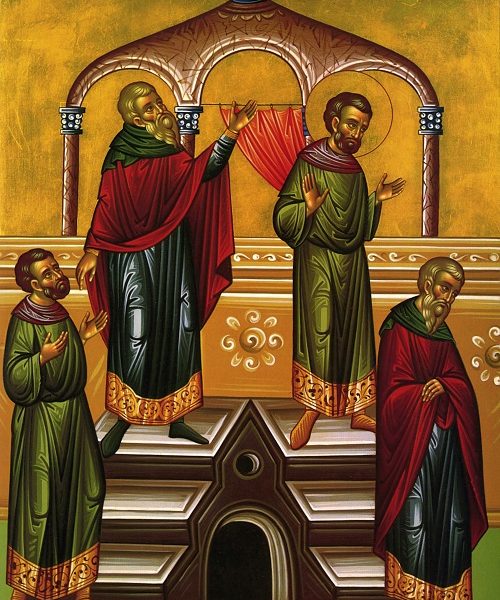Self-Sufficiency and Humility
22 February 2021Today’s Gospel reading presents us with two typical kinds of people: a Pharisee and a publican, both of whom are praying in the temple. They are the exact opposites of the society of the time. One was pious and righteous in the eyes of the people, an expert on the Law, a member of the group of the Pharisees, who were the leading religious class. The other was a representative of the class of sinners, of those whose profession was synonymous with rapacity, violence and swindling people out of their possessions. In the view of the whole of society at that time, a publican was the worst of sinners.

So what do these two people say in their prayer? Let’s look first at the prayer of the Pharisee, to see if this type of practicing religious person is familiar to us today, also. ‘Lord, I thank you that I’m not like other people, an extortioner, unjust or an adulterer; or like this publican here. I fast twice a week and give the temple a tenth of all my income’. This prayer is a hymn of praise to himself and his virtues. The Pharisee lists his deeds and feels incomparably superior to the rest of the people, whom he considers to be sinners as a whole. He thanks God, or rather congratulates himself, because he’s loftier than others. He has no sense that he’s lacking anything. He’s self-sufficient and not dependent in the least on God, since he has so many of his own deeds to boast of and on which he can rest his case. For him, the center of the world isn’t God but himself and his generally-acknowledged virtues. It would be impossible for God to have a different opinion about this accomplished and virtuous man. He feels as close to God as if he’d made an agreement with Him for both of them together to judge and condemn all sinners.
But does God agree with this certainty on the part of the Pharisee? The answer is given to us at the end of the parable. Let’s look, however, at the prayer of the publican. He’s devastated because of his transgressions and realizes that all his actions and deeds are linked to sin. Beating his breast, he humbly entreats God to show mercy: ‘My God, have mercy upon me, sinner that I am’. He judges no one but merely condemns himself, recognizing that he’s completely lost without God’s mercy.
At the end of the parable we’re told that it was the humble publican, not the conceited Pharisee who was ‘justified’, that is who found grace and returned home reconciled to God. For ‘for those who exalt themselves will be humbled, but those who humble themselves will be exalted’. This ending to the narrative must have come as a surprise to many of those listening to Christ, because they would all have believed in the religious superiority of the Pharisees over the sinful publicans. Jesus, however, wanted to reverse the prevailing opinion which saw human actions in purely external terms. He wanted to show that the depths of the heart, which God alone knows, don’t always conform to outward appearances.
Of course, to avoid any misunderstanding it must be said that Jesus didn’t condemn the Pharisee for being a virtuous person who performed his religious duties. He condemned him for basing his life on them rather than on God, for feeling self-contained and for not even suspecting that the basis of all the virtues is humility. Similarly, Christ doesn’t praise the publican for being sinful but for being aware that he is and thus rightly placing himself at the disposal of God’s judgment, while asking for His mercy. This was because he awaited his salvation from God, having nothing of his own to depend on.
As the Gospel of Saint Luke makes clear in the introduction to the parable, it’s addressed to those who are secure in the own piety and look down on others. These are people who are to be found in every day and age. People who believe themselves to be religiously self-sufficient and accomplished in the virtues. They condemn others and consider them to be irrevocably mired in sin. They take great pleasure in describing the punishments God has devised for them, forgetting that they themselves will be subject to the same impartial judgement of God. Since such behavior involves hypocrisy, in many languages ‘Pharisee’ has come to mean the same as ‘hypocrite’.
The Church has placed this excerpt as the reading for the start of the Triodio because it wishes to protect the faithful from the ‘conceited thinking’ of the Pharisee, to which all devout Christians can fall prey. This is why it stresses the example of the publican, who repents over his life and prays with real contrition. The following hymn [kontakio] summaries beautifully the meaning of the parable:
‘Let us flee the proud speaking of the Pharisee and learn the humility of the Publican; with sighs let us cry to the Savior: Be merciful to us, for you alone are quick to forgive’.






